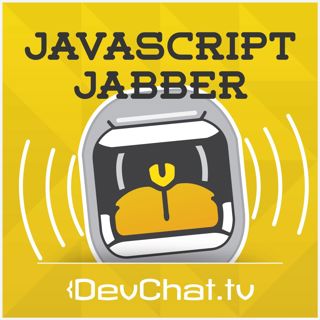
Beyond JavaScript: Master TypeScript at Scale at SquiggleConf - JSJ 646
Dan together with Josh Goldberg, a prominent open-source maintainer and author of "Learning TypeScript, dive into the world of TypeScript and JavaScript with a special focus on the upcoming Squiggleco...
28 Aug 20241h 10min

Deep Dive into Metrics and Monitoring with Prometheus and Grafana - JSJ 645
Dive into a fascinating discussion blending the worlds of literature, gaming, and tech. In this episode, Chuck and Dan explore the intriguing connections between The Hobbit and The Lord of the Rings, ...
20 Aug 20241h 25min

Crafting Code and Community: AI, LeetCode, and Meetups - JSJ 644
In this episode, they dive deep into the world of coding, meetups, and the evolving landscape of technical interviews. Join them as they explore the fascinating use of OpenAI's technology for coding a...
13 Aug 20241h 9min

Overcoming JavaScript Load Issues: Import Maps and Performance Enhancements - JSJ 643
In this episode, they dive deep into the intricate world of JavaScript loading and web performance. Join the panel with insightful discussions led by Dan, Charles, Steve, and special guest Yoav Weiss—...
8 Aug 20241h 35min

Personal Branding for Developers with Morad Stern - JSJ 642
The JSJ panel talks with Morad Stern from Wix about personal branding; what it is, why it’s important for developers, and how to build it.LinksObama asks America to learn computer scienceConfiguring A...
30 Juli 202451min

Making AI Accessible for Developers - JSJ 641
In this captivating episode, they dive deep into the world of AI, hands-on learning, and the evolving landscape of development with Steve Sewell from Builder.io. They explore the misconceptions about ...
23 Juli 20241h 25min

Framework Comparisons, Real User Metrics, and Effective Performance Tools - JSJ 640
In today's episode, they dive deep into web performance optimization and the strategies employed by our expert panel to achieve it. Join Dan, Steve, Charles, and guest Vinicius Dallacqua as they explo...
16 Juli 20241h 19min

Adapting to Effect Cluster: JavaScript Developers' Guide to Enhancing Code Maintainability - JSJ 639
In today's episode, they dive deep into the world of JavaScript and TypeScript. They explore the innovative message-passing style between components using Effect Cluster, a game-changing alpha product...
9 Juli 20241h 35min






















